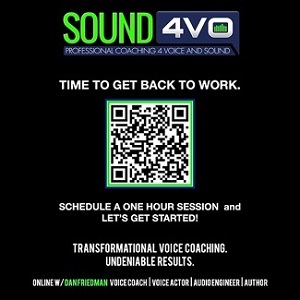|
Character Development in Voice-Overs:
Observe, Listen & Draw On Memories
By Bettye Zoller
Voice Talent & Coach
VoicesVoices.com
 Just as actors must do when working in theatre and film, finding your character in voice-over scripts - although in a more brief script - employs the same technique. Just as actors must do when working in theatre and film, finding your character in voice-over scripts - although in a more brief script - employs the same technique. I often tell my students that every voice-over script is a one-act play.
Think about all of the characters you portray in the course of one single day in life! You may voice lines as,
All of the characters you will run up against in voice-over scripts are already inside of you, learned from real life.
What you must do as an actor is summon them all up when you need them. You must recall them.
These techniques will serve you well when narrating audiobooks too!
MEMORY TOOL
The late Uta Hagen, the world renowned acting teacher and master actor, once told me,
These images will always echo in my mind.
When I was a child actor signed to Metro Goldwyn Mayer studios in Hollywood, an acting coach made us cry real tears on cue! We summoned up these tears by recalling a sad moment in our young lives.
Some remembered the death of a beloved pet. I had never owned a dog or cat, so my task was more difficult. Finally, I thought of my beloved grandmother dying some day and how much I would miss her. I cried buckets and my teacher praised me!
WHAT WORKS?
That taught me a valuable lesson: You have to be “inventive” as an actor.
What works and what doesn’t work? Do you know? You should know!
Of course, many voice-over scripts do not require voice acting but only selling. These are the announcer scripts, the tags, the straightforward copy concerned with announcing a big sale.
But now and then (and voice talents are always thrilled when getting this type of script) we are called upon to portray characters, to use our voice acting skills.
The copy has a plot line! Characters act with one another and play off one another.
BE VERSATILE
Sometimes the script may call for us to sound older or younger than our chronological age. Be sure you have this one under your command! A good voice actor should be able to sound various ages.
That is not to say one must be all things to all people. We voice some types of things better than others.
Just as some of us are better at math while others are better at music, every voice actor will discover his or her personal strengths (and lacks!). That’s what makes you who you are.
But within the “you factor,” you must become as versatile as a voice as possible. Keep trying to grow and to add new dimensions to your voice capabilities. An actor studies throughout life!
DEFINE CHARACTER
What type of person is the character you are to voice in this script? Is he a loudmouth (but likeable) or is he a loudmouth whom everyone hates?
Is she a tired mom who is struggling with childcare and a job, while missing a child support check? We feel sorry for her, yes?
Is the character a manager in an office who is angry and no one likes him, or is the manager angry but someone who is, inside, is a really nice guy who is overworked and frustrated?
These differences should come across in your vocal portrayal.
How does an egotistical, wealthy playboy sound asking a girl for a date? How does the voice of a shy, sweet-natured man sound when asking a girl for a date? Can you voice these differences?
OBSERVE & LISTEN
Next time you’re around teens, observe and listen to their voices. When you are with senior citizens, listen carefully to their conversations with one another. What differences in the two age groups do you hear?
Making notes may be a good idea for you. Start a “character voice notebook” with your musings. You can later refer to these notes.
Observing and listening: This is the stock and trade of voice acting!
Theatre and film actors have a more difficult task. They must study not only how characters sound, but how they LOOK.
But homework is still necessary for voice acting. Use your own life and experiences and then invent and “playact” the rest.
CREATE BACK STORY
If it works for you, invent a “back story.” If you’re lucky, the producer or scriptwriter will provide a back story to you. Otherwise, you’ll need to figure it out for yourself.
For example, “This manager is angry at his workers because they are not producing enough revenue. In addition, his bad mood has been aggravated by the fact that he was involved in a ‘fender bender’ this morning in the parking lot. However, he really is a nice guy most of the time.”
Your voice will respond to these images in your mind. That’s an actor’s toolbox.
If you thought that voice-overs were simply “talking,” you now realize,that voice-overs require voice acting. Happy voice acting! And remember … every moment is a new acting teacher. Study hard!
Bettye Zoller, owner of VoicesVoices, is one of the nation's best-known voice, speech, acting, and voice-over coaches, and is a winner of ADDY, Clio, Golden Radio and Audie Awards. She holds advanced degrees from three universities, has served on university faculties for 30 years, is the Feagin Artist Guest Professor at Tulsa University, and presents workshops sponsored by Women in Film and Television. Her home is Dallas but she teaches, by invitation, worldwide. She is also a professional audio engineer producer, owns a recording studio in Dallas, and is a Simon & Schuster audiobook author and reader.
Email: btzol@aol.com
Web: www.voicesvoices.com
|
|
|
Tell Us What YOU Think!
Please Note: Since we check for spam, there will be a slight delay in the actual posting of your comment.
Comments
No comments have been posted yet. Hurry, and you could be the first!






.png)


click for new article alerts